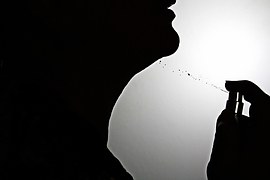Paralysed. That is the only word to describe how I felt while fingering a rather lovely cashmere jumper in a rather lovely boutique shop in my local town. (This is how the impoverished get their kicks, you know.)
It wasn’t the jumper itself that stopped me in my tracks, but the woman standing next to me, casually assaulting a blue, cotton shirt.
She was wearing ‘Paloma Picasso’. The fragrance. And suddenly, I was catapulted back to 1984.
And I couldn’t move because I was overwhelmed by memories of beautiful, insouciant sixth form girls whom I’d worshipped silently as they flounced about our convent boarding school dressed in Benetton twin sets and tossing unruly manes of hair as they went.
I aspired to be like them. And more importantly, to smell like them.
These were girls who glided through the world in fragrant clouds which announced their arrival minutes before they entered a room and which lingered long after they’d departed.
It was the scent of confidence, wealth and sex appeal.
My mother had two of these qualities; she was confidently sexy and came complete with false eyelashes and a habit of flirting with tradesmen which I found mortifying.
(Little did I appreciate then how costly getting a man to deal with your toilet flange could be.)
She wore ‘Ma Griffe,’ a fragrance described as ‘bold and playful’ which indeed she was. She had the ‘signature scent’ of a proper, grown-up woman.
As I suffered through the pustulant years of adolescence, I deduced that perfume was a key ingredient in creating a metaphysical calling card.
I experimented with a number of fragrances I’d enjoyed on women of my acquaintance.
My mum’s friend Jill was the epitome of glamour in my eyes. She had hair like Farrah Fawcett, a long, tan leather coat and she wore ‘Opium’.
I wore ‘Opium’. But not for long.
My dad said it was overpowering and gave him a headache whenever I wore it in his car.
Reliant on lifts to the happening hubs of my teenage life (the library and the chip shop), I reluctantly stored it in the back of my drawer.
I flirted briefly with ‘Rive Gauche’, the perfume choice of a solicitor whose photocopying I was paid to do one summer holiday.
The advertising persuaded that it was all the things I wasn’t: hip, intellectual, bohemian and French, but it failed to transform me.
A boyfriend attempted to impress by buying me ‘Joy’ by Jean Patou, just because it had been, by reputation, the world’s most expensive perfume.
This time it was me who suffered the headaches.
I finally settled on YSL’s ‘Paris’. It arrived on the market at about the same time as I did: 1985. It felt feminine and soft and most importantly, it didn’t knock out designated drivers.
I stuck with ‘Paris’ for a very long time, believing that a woman owed her fragrance some fidelity.
However, not long after the birth of my children, my hormones must have revolted or something because my head was turned.
I cheated on Yves, inviting myself into the House of Lanvin where I liberally doused myself in ‘Eclat d’Arpege’.
My relationship with Lanvin lasted a couple of seasons, but ultimately, I couldn’t commit to all those Sicilian lemons and wisteria.
And then I developed a terrible Duty Free habit.
Each summer I’d buy a new fragrance, ever hopeful of redefining myself through perfume.
I wore ‘Insolence’, ‘Happy’ and ‘Beautiful’ depending on my mood.
I met high achieving women at dinner parties who wore leather trousers and Jo Malone. I bought a bottle of ‘Pomegranate Noir’ on an overheated credit card but somehow I didn’t smell high achieving myself. (Must have been the leather trousers?)
At forty, I picked up a bottle of Paul Smith’s ‘Rose’. In it I detected notes of the perfume which defined my youth, but it has an edge. If you can call green tea edgy.
I like the way Paul Smith makes me smell. I like that other people like the way he makes me smell. I like that I have a smell.
One day, I hope to unwittingly paralyse someone in a shop.


